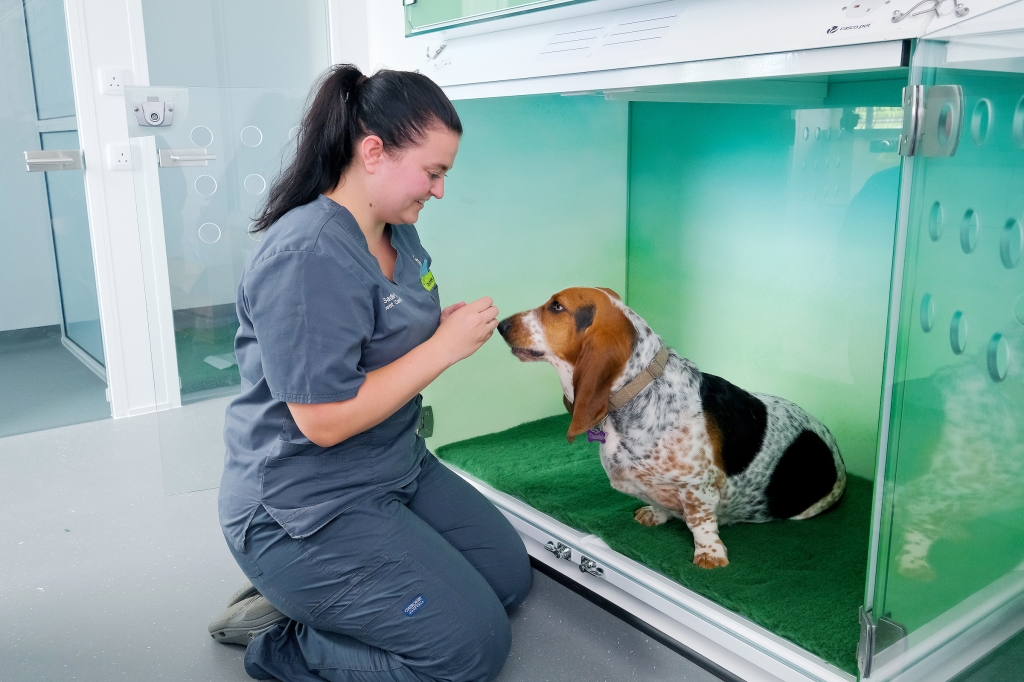
The project has won Quality Improvement Knowledge Champion 2024
CVS White Lodge Practice Improves Post-operative Pain Scoring Audits And Resulting Practice Protocols
CVS’ White Lodge Veterinary Surgery in Exmouth has run a project to improve pain scores in cats and dogs post operatively and updated its practice protocols as a result.
The first opinion practice initiative has been recently recognised with RCVS Knowledge Champion status at its 2024 awards.
Post operative pain should be prevented for ethical reasons and due to a large range of physiological consequences - including poor appetite, increased blood pressure, cytokine production, and poor immune function. Pain scoring should be routinely done post operatively. The audit used the Glasgow Pain Scoring chart which is already validated and widely use in the veterinary profession.
To start the project White Lodge initially undertook a review to identify which patients could have their welfare and comfort improved post operatively. The first cycle of this audit involved pain scoring every patient one-hour post-surgery. In addition to this, they recorded all drugs given prior and during the procedure, whether rescue analgesia was given and if it was effective. The species, breed and type of operation was also noted. This information was then used to identify groups of patients with higher pain scores.
In the first stage of the audit 207 operations were analysed accounting for 40% of the operations in practice. The results showed 10.4% of operations received rescue analgesia – this consisted of 11% of all dogs in the study and 2% of all cats. Abdominal surgeries, bitch spays, and other operations* were found to have significantly higher pain scores** than castrates, mass removals, dentals and cat spays. It was found that 24% of bitch spays needed rescue analgesia.
The second cycle of the audit saw White Lodge clinicians adapt protocols and provide training to improve the welfare of these animals. The practice ran CPD training for all clinicians at its practice with a European College of Veterinary Anaesthesia and Analgesia Diplomat. Further to this, existing practice protocols were adjusted for all operations, specifically those reporting higher pain scores. This included; starting to use the drug lidocaine; attaching pain score charts to all anaesthetic monitoring sheets to aid correct scoring and simplify data collection; surgeons changing from ovariohysterectomies to ovariectomies. In addition, all colleagues were re-trained to ensure they were comfortable and competent using the Glasgow Pain Scoring Chart.
After these new protocols were adopted, clinicians re-audited new post operative patient pain to evaluate if it had improved its pain scores. The percentage of dogs over the pain scoring threshold dropped from 24% to an average of 19% (lidocaine and ovariohysterectomy) and 10% (lidocaine and ovariectomy). The results showed that adding lidocaine made an improvement to bitch spay, abdominal surgery and ‘other’ surgery pain scores.
Adrian Baverstock, Practice Director at White Lodge Veterinary Practice said: “This pain management project has had an extremely positive effect on the team as a whole. Though initially the project threw up some uncomfortable results which led to difficult questions being asked within the team, we were all naturally extremely interested in improving animal welfare and learning new skills.
“The whole process has involved upskilling the team and the results - showing improvement – has given a great lift to the team and a sense of pride in their work. We’re now sharing the work of our audit with colleagues across other practices to help improve standards across the profession.
It is great that CVS encourages us to pursue these projects through audits and research, with the company also funding a grant for research into lungworm prevalence which the practice has also been involved with.”
CVS Group operates across small animal, farm animal, equine, laboratories and crematoria, with 500 veterinary practices and referral centres in the UK and Australia. In the last five years the company has invested nearly £80 million in its sites, facilities and equipment, in addition to industry leading training and support, to give the best possible care to animals. For further information on CVS Australia visit https://www.cvsvets.com.au/.
* Surgery that did not categories as a spay, castration, mass removal, abdominal surgery or dental
** P value + 0.004
More from CVS UK Ltd
- Manchester Veterinary Specialists celebrate 15 years of experience
- Ultrasound scan rates dramatically up in clinical improvement project
- Dog cheats death after animal hospital removes one-foot-long stick from lung
- Southwest CVS small animal practices run programme to eliminate unnecessary antibiotic use
- Church Walk Vets moves to new larger practice in Barrow-in-Furness

 1 month ago
1 month ago  377 views
377 views